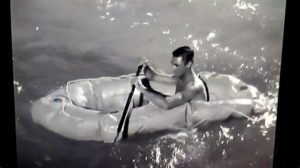 “Do you not know that all the runners in a stadium compete, but only one receives the prize? So run to win. Each competitor must exercise self-control in everything. They do it to receive a perishable crown, but we an imperishable one. So I do not run uncertainly or box like one who hits only air. Instead I subdue my body and make it my slave, so that after preaching to others I myself will not be disqualified.” 1 Corinthians 9:24-27
“Do you not know that all the runners in a stadium compete, but only one receives the prize? So run to win. Each competitor must exercise self-control in everything. They do it to receive a perishable crown, but we an imperishable one. So I do not run uncertainly or box like one who hits only air. Instead I subdue my body and make it my slave, so that after preaching to others I myself will not be disqualified.” 1 Corinthians 9:24-27
In these verses Paul compares the Christian with an athlete in competition. He talks about our discipline, our effort, and our integrity. These are good verses for us to keep in mind because today our opponents are many. Besides battling against our own flesh and the principalities and powers, we battle against a world that has turned upside down and is changing the rules of morality to suit a disintegrating society.
Christianity is a faith of common sense. As we stray further and further from Christian principles we also leave common sense further and further behind. I find it amazing that groups that will close entire sections of a forest down for the tiniest of creatures can support the continual killing of the tiniest of humans. Unfortunately, most Christian principles are recognized by everyone as just Christian principles. Some are so against Christianity that they must oppose everything about Christianity to prove their dismissal of the faith. Consequently, they must reject many of the common sense principles that Christianity brings to this world. Much of the world is going along with this craziness, but every day you will hear people saying, “where is people’s common sense?” Sadly, it is disintegrating by the same proportions that people reject the Biblical world perspective.
I read a story about an unusual happening in the 1990’s in an NCAA Division II national championship cross-country race in California. A runner named Mike Delvaco and 127 of the state’s best runners were competing on a 10,000 meter course to see “who would win the prize.” About three miles into the race, Delvaco was somewhere in the middle of the pack, when he realized that the runners had made a wrong turn. So he yelled out, “You’re going the wrong way,” but they didn’t listen. Only 4 others followed Mike when he turned in the right direction…and suddenly, he found himself in the lead. He must have had some doubt when the field dropped from 128 to 5, but he stayed on course.

However, that lasted only about a mile. Mike and the runners who followed him were soon reunited with the larger pack who, having gone the wrong way, actually shaved about a half a mile off the course. The shortcut of the many put them ahead of the small band of runners that took the correct path. This was bad enough for Mike, but the final blow came when, because so many of the runners had gone the wrong way, the officials changed the official course route to accommodate their error. So when Mike Delcavo finally crossed the finish line, he was number 103 overall. His right action, as well of that of four others, was ignored and because so many went the wrong way they were rewarded with a shorter race. At the end of the race, one of Delcavo’s competitors “thought it was funny that he went the right way.”
Isn’t that a telling statement? In our mixed up world, when so many are wrong, wrong becomes right. Instead of the world keeping a standard of acceptable behavior, it changes what acceptable behavior is. But although the world changes “the course” to accommodate itself, God does not. He knows the course; He made the course; and He expects us to run the course as marked. Numbers do not influence God. No matter how many go astray, he does not accept the majority as a sign of rightness. In Noah’s day God did not change his plan for the sake of the majority.
When I was in junior high I had a math teacher named Mrs. Woodward. She was a stickler for the right answer. No matter how many kids missed a question or no matter how many different answers they had, she would only accept the right one. Unbelievable! But would she have helped us as students by accepting less than the truth? Maybe it would have helped our grade for that semester, but it would have cost us in the long run. Mrs. Woodward refused to enable our future failure by accepting wrong as right.
In our day and age the majority seems to dictate the rightness or wrongness of an issue. In some cases, that might be fine (speed limits, taxes and fees, etc.), but in moral issues the majority can’t be the determining factor. In Jeremiah 17:9 God tells us, “The heart is more deceitful than anything else, and incurable–who can understand it?” Do we really want a majority deciding the moral direction of the country? Yes, if the majority uses the Word of God as a moral compass. No, if the only compass they have is a deceitful heart.
Contrary to what many believe in this day and age, there is right and wrong. Relativism is a dead end street. Without any standards to make decisions we are at the whims of the loudest, biggest, or meanest. Much of the world uses similar standards of measurements for distance, weight, and volume. That is so everyone can understand each other. If there were hundreds of different measurements for lengths, every distance would have to be renamed hundreds of times. No one would be able to determine if a mile was actually a mile. In some countries, a mile might not exist as a measurement and they would have to invent a new word for that distance. It would be very cumbersome.
Only a few people at New Hope (my church) know this (because I mentioned it in a sermon), but my height is also a measurement found in the dictionary and and on the internet. I am a smoot. One smoot is equal to Oliver Smoot’s height in 1962 which was 67 inches. Smoot was a student at MIT and as a fraternity prank they used his height to determine the length of the Harvard Bridge which stretches between Boston and Cambridge. Smoot would lie down and his frat brothers would make a new mark each time he repositioned. The bridge’s length turned out to be 364 smoots plus or minus one ear. The markings on the bridge are redone each year by the fraternity and with the blessing of the city have been maintained through several bridge renovations. It has become quite a tourist attraction. So at 5’ 7” I am a smoot. (By the way, for the curious, the ark was about 81 smoots long, give or take an ear!)
Smoot would lie down and his frat brothers would make a new mark each time he repositioned. The bridge’s length turned out to be 364 smoots plus or minus one ear. The markings on the bridge are redone each year by the fraternity and with the blessing of the city have been maintained through several bridge renovations. It has become quite a tourist attraction. So at 5’ 7” I am a smoot. (By the way, for the curious, the ark was about 81 smoots long, give or take an ear!)
You can see what happens. The smoot has to be translated back into measurements with which we are familiar, or a smoot is meaningless. When we don’t have any standard of right or wrong and everyone just determines what it is on his own, and it is a chaotic situation. Actions that used to be considered “wrong” not only become acceptable, but become the only actions that are “right.” I did a chapel service at a Boy Scout Family Camp one weekend. I went through the scout oath, scout law, scout motto, etc. from the 1911 handbook. I compared the admonitions of the handbook to the admonitions of the Bible.
Needless to say, things have changed in our world. When a phrases like, “physically strong, mentally awake, and morally straight” occur, they rely on accepted standards of physical strength, mental alertness, and morality. The definitions of those terms have been so obscured that what these phrases mean now is anybody’s guess. Of course, for those of us that believe that the Bible defines standards for behavior, we also interpret the handbook phrases the same way. We take them for what they meant in 1911 when God played an important part of the Scouting experience. Those who do not hold a Biblical standard look at a term like “morally straight” and must determine what it means on their own. To some “morally straight” might mean being straight with themselves and doing whatever they want. Is that what it originally meant in the scout handbook (or in the Bible)? Probably not.
so obscured that what these phrases mean now is anybody’s guess. Of course, for those of us that believe that the Bible defines standards for behavior, we also interpret the handbook phrases the same way. We take them for what they meant in 1911 when God played an important part of the Scouting experience. Those who do not hold a Biblical standard look at a term like “morally straight” and must determine what it means on their own. To some “morally straight” might mean being straight with themselves and doing whatever they want. Is that what it originally meant in the scout handbook (or in the Bible)? Probably not.
Like Mike Delvaco showed us, taking the right path does not always “pay off” with reward. It takes courage and conviction to follow wholeheartedly after God instead of the rest of the world. Sometimes it can get lonely running alone, and we may be wondering where the others are going. We might even yell out, “You’re going the wrong way,” but most won’t listen. Instead, we will be heckled and ridiculed by others who pursue their own course. And ultimately, the “race officials” may reward others for bad turns. The news consistently show us that! But we must remain on God’s course. We must run with discipline, doing our best, staying on course, and when the race is over and when we have finished the course, He who is the true judge will say to us, “Well done, good and faithful servant!”

 Our impatience would lead to an inferior result. Let’s allow God to move at the pace He wants, because it will always be better than the pace we call for. If we ask the Lord to renew our hearts and desires today, and give us a fresh infilling of strength to wait on His perfect timing, He will do so. He wants us to have the greatest gifts at just the right time and because He is the creator of both- it is best if we let Him handle it.
Our impatience would lead to an inferior result. Let’s allow God to move at the pace He wants, because it will always be better than the pace we call for. If we ask the Lord to renew our hearts and desires today, and give us a fresh infilling of strength to wait on His perfect timing, He will do so. He wants us to have the greatest gifts at just the right time and because He is the creator of both- it is best if we let Him handle it.





 the smell, the movement of hand to lips, and a host of other habits. There weren’t enough packs of gum, nicotine patches, or suckers that could replace that thirty-year habit. He replaced the habit with prayer. He said he prayed non-stop all the way from Portland (where he smoked his last cigarette) to Grants Pass (where he died over forty years later). He said that after that day in 1969 he never craved a cigarette again. No nicotine patch for him- he put on a prayer patch instead. God always supplies the alternatives if we want to use them.
the smell, the movement of hand to lips, and a host of other habits. There weren’t enough packs of gum, nicotine patches, or suckers that could replace that thirty-year habit. He replaced the habit with prayer. He said he prayed non-stop all the way from Portland (where he smoked his last cigarette) to Grants Pass (where he died over forty years later). He said that after that day in 1969 he never craved a cigarette again. No nicotine patch for him- he put on a prayer patch instead. God always supplies the alternatives if we want to use them. ible reading Abraham was called to make a sacrifice and his son was laid upon the altar. When the time came for the sacrifice, God didn’t say, “Nevermind, Abraham. You proved yourself. Untie Isaac and go home.” No, God filled the void that was left on altar with a ram caught in a thicket. If God asks us to give up something, he will graciously provide a better alternative.
ible reading Abraham was called to make a sacrifice and his son was laid upon the altar. When the time came for the sacrifice, God didn’t say, “Nevermind, Abraham. You proved yourself. Untie Isaac and go home.” No, God filled the void that was left on altar with a ram caught in a thicket. If God asks us to give up something, he will graciously provide a better alternative.
 This way the sculptor was able to palm off
This way the sculptor was able to palm off Spray-on Mud was created for use on the outside of your SUV or four-wheeler. That way it appears you use your expensive hobby for more than taking up space in the driveway. Spray it on and friends might think you’ve just returned from a wilderness adventure.
Spray-on Mud was created for use on the outside of your SUV or four-wheeler. That way it appears you use your expensive hobby for more than taking up space in the driveway. Spray it on and friends might think you’ve just returned from a wilderness adventure.





